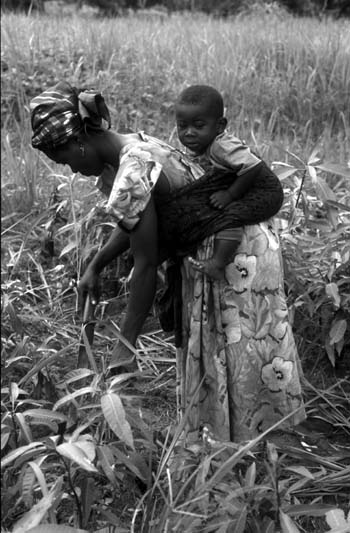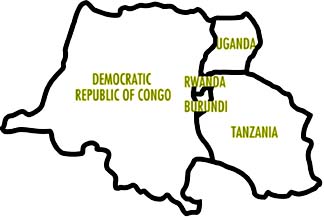
KEY FACTS
Countries covered by the appeal: Burundi, Democratic Republic of Congo, Rwanda, Tanzania and Uganda
Total population: 140 million
Displaced population: 5 million
(Source: UN; World Bank; CIA Factbook)

FAO IN GREAT LAKES REGION
From its regional emergency coordination office in Nairobi, FAO provides technical assistance together with information on food security and nutrition to partners and governments in the Great Lakes Region.
Background
There is a growing optimism in the Great Lakes Region fostered by regional co-operation and the progress towards democratic governance in Burundi and the Democratic Republic of Congo (DRC). These positive expectations are increasingly shaping the humanitarian context in the region and are leading to shifts and new humanitarian priorities including those linked to refugee returns.
At the same time the picture at a local level continues to be volatile with populations in a number of areas remaining vulnerable to the effects of ongoing and new crises. Rebel groups, often fuelled by resistance to political processes, still pose a major threat to stability in Uganda, DRC and Burundi. The effect of such violence on civilian populations is compounded by the restrictions it imposes on access and humanitarian assistance. An estimated five million people remain displaced either within their national borders or in neighbouring countries, and many more are affected by other man made or natural crises.
The regional nature of the problems facing the Great Lakes countries requires a regional response. Stakeholders to the Great Lakes Consolidated Appeals Process (CAP) continue to work together to monitor the situation in the region and to respond to ongoing and new emergency situations. The strategic priorities identified by the Great Lakes CAP stakeholders (coordination, preparedness, protection, life saving/enhancing assistance) aim to reflect operational priorities for the effective delivery of humanitarian assistance and to highlight key humanitarian concerns.
Needs analysis: Food security and agriculture sectors
An estimated 85 percent of the population in the Great Lakes Region live in rural areas and depend on agriculture for their livelihood. Food insecurity in the region is a result of a combination of both human-induced and natural disasters. Livelihoods and productive capacity have been adversely affected over the past ten years due to conflict. Millions have been displaced, and these populations, largely dependent on agriculture to survive, require assistance to resettle and rebuild their lives. Climatic factors, crop diseases and resultant poor agriculture production have exacerbated the situation. Localized drought has affected parts of northern Tanzania, northern Burundi, south and southeast Rwanda, as well as northern Uganda. Heavy flooding has caused displacement and disruption to the lives of populations in coastal areas of Tanzania and in some parts of DRC.
The escalation of the prevalence of HIV/AIDS continues to intensify all of these problems. Coping mechanisms for HIV/AIDS-affected households come under increasing stress due to medical expenses and less time dedicated to agricultural activities. This results in decreased productivity, increased food insecurity and rising levels of malnutrition at the household level.
Humanitarian organizations with programmes covering countries in the region have identified a lack of regional-level information and analytical tools as major conflict or failure of governance, has demonstrated the vital role of stand-by resources and flexible early response solutions. Moreover, the risk of a disparity between the funding cycle and the agricultural calenda affected areas can delay emergency interventions. constraints. Most organizations have been aiming to develop and use assessment and evaluation methods that allow comparison among countries and enable timely decisions to be made on prioritizing and balancing resource allocations. FAO employs a number of tools to raise awareness with donors and partners including regular meetings and communications at both country and regional levels. As part of the Food Security and Nutrition working group, the agency is in the process of developing an information package allowing comparisons between food security and nutrition variables in different countries in the region. The inter-agency group also plans to undertake advocacy activities to draw attention to priority issues.
|
In the Great Lakes Region, FAO plays an important role in supporting HIV/AIDS affected households through food security activities such as training in vegetable gardening and nutrition. Taking a regional approach by sharing lessons learned between partners in the different countries ensures that the problem is tackled in a more effective way. |
Furthermore, the emergence of new food crises in Africa in the past few years be it as a result of natural disasters, conflict or failure of governance, has demonstrated the vital role of stand-by resources and flexible early response solutions. Moreover, the risk of a disparity between the funding cycle and the agricultural calendar in affected areas can delay emergency interventions.
PROPOSALS
FAO RELIEF AND REHABILITATION ASSISTANCE
Funding
required: US$ 3 615 000
|
Support to FAO Regional Emergency Coordination |
Issues addressed: Humanitarian organizations with programmes covering countries in the region have identified a lack of regional-level information and analytical tools. Most organizations have been aiming to develop and use assessment and evaluation methods that allow comparison among countries and enable timely decisions to be made on prioritizing and balancing resource allocations.
Objectives: To assess and respond to emergency developments in the region, enhance coordination of interventions, provide partners with information on food security and strengthen collaboration.
Activities: FAO’s Emergency Coordination office for Africa (ECA) acts at a regional level promoting coordination, having a backstopping role for partners and teams in the field. Another feature of the ECA is to promote the fielding of Emergency Response Teams at the onset of new emergencies. The office will strengthen its technical capacity by hiring a Livestock Adviser, Food Security and Nutrition Adviser, Operations and Liaison Officer, HIV/AIDs and Nutrition Officer and a Geographic Information Systems (GIS) Officer to provide added support to operations.
Beneficiaries: UN agencies, NGOs, governments, donors, academic institutions, regional organizations, IDPs, returnees and refugees and host communities affected by emergencies.
Implementing partners: FAO Emergency Rehabilitation and Coordination Units and FAO Representations in the region, NGOs, UN agencies, donors, academic institutions, regional organizations.
Duration: January 2006 - December 2006.
Funds requested: US$ 1 140 000.
|
Regional Rapid Response Fund (RRF) |
Issues addressed: The emergence of new food crises in Africa has demonstrated the vital role of stand-by resources and flexible early response solutions. Moreover, the risk of a disparity between the funding cycle and the agricultural calendar in the affected area can delay emergency agriculture interventions.
Objectives: To establish a fund to support immediate needs assessments and to guarantee the timely provision of essential inputs to rural agricultural populations at the onset of an emergency.
Activities: Apart from establishing a Regional Rapid Response Fund, support to the deployment of an Emergency Response Team at the onset of a new emergency, advising humanitarian actors on the evolution of the situation in affected countries.
Beneficiaries: Rural agricultural populations in the region affected by unexpected natural disasters and/or complex emergencies.
Implementing partners: FAO Emergency Rehabilitation and Coordination Units in the region and their partners, including local and international NGOs, UN agencies, donors and counterparts.
Duration: January 2006 - December 2006.
Funds requested: US$ 525 000.
|
HIV/AIDS mitigation through improved food security for HIV/AIDS affected households |
Issues addressed: For households with HIV/AIDS-infected member(s), coping mechanisms come under increasing stress due to medical expenses and less time dedicated to agricultural activities. This results in decreased productivity, increased food insecurity and rising levels of malnutrition at the household level.
Objectives: Support food security for HIV/AIDS affected households through agricultural projects directed at improving the diet, producing marketable food surpluses and enhancing nutrition.
Activities: Working through NGOs already involved with home-based care, voluntary testing, counselling and other HIV/AIDS care and awareness activities. The project will also support the exchange of experiences between stakeholders within HIV/AIDS mitigation and home-based care, to improve the knowledge of potential food security responses through distribution of materials, lessons learned training and exchange visits.
Beneficiaries: 10 000 peri-urban and rural households with infected and affected members, orphans and care- givers.
Implementing partners: Ministry of Agriculture and NGOs.
Duration: January 2006 - December 2006.
Funds requested: US$ 650 000.
|
Reducing the threat of hunger through cassava cutting multiplication in the region |
Issues addressed: The Cassava Mosaic Disease has had a significant impact on cassava production in the region, reducing local cassava yields by up to 80 percent. The disease has had devastating effects on food security and resilience amongst vulnerable households with few other coping-mechanisms.
Objectives: To restore resilience and food security of vulnerable households through support to self production of cassava mosaic disease resistant planting materials.
Activities: The project will assist farmers to disseminate mosaic-tolerant cassava varieties. The multiplication and establishment of cassava primary gardens in selected areas will create a source of planting materials for future use by returnees and other targeted beneficiaries.
Beneficiaries: Rural agricultural populations in the region affected by cassava mosaic disease coupled with natural disasters or complex emergencies.
Implementing partners: FAO Emergency Rehabilitation and Coordination Units in the region and partners.
Duration: January 2006 - December 2006.
Funds requested: US$ 1 300 000.